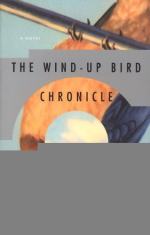
|
| Name: _________________________ | Period: ___________________ |
This test consists of 5 short answer questions, 10 short essay questions, and 1 (of 3) essay topics.
Short Answer Questions
1. Who does May Kasahara imagine she is a lot in Chapter 28?
2. Who rescues Toru from the well in Chapter 37?
3. Near the end of Chapter 18, May says that she woke up one day discovered what?
4. What strange part of her anatomy does Malto Kano reveal in Chapter 30?
5. What is the healing room of the Residence made up to look like in Chapter 17?
Short Essay Questions
1. In Chapter 22, what does Kumiko say about her current state of mind?
2. How is Toru implicated in an assassination attempt in Chapter 33?
3. What sad reality does May Kasahara admit to in Chapter 18's letter?
4. What plans do most women in May Kasahara's factory have?
5. What problem does Ushikawa admit with Kumiko's meeting Toru, and how does he solve it in Chapter 19?
6. That is Nutmeg's concern in Chapter 24?
7. Why is Toru content in Chapter 25?
8. What war atrocity occurs in Chapter 26's story?
9. What does Toru do after Nutmeg and Cinnamon stop coming to the residence?
10. How does Nutmeg's marriage end in Chapter 20?
Essay Topics
Write an essay for ONE of the following topics:
Essay Topic 1
Dreams play a key role in the advancing of plot in Murakami's novel. Write an essay, discussing the role that dreams play in Toru Okada's journey. Who does he meet while in a dream state? What new information does he gain from these dreams? Write a paragraph about each type of dream the Toru has over the course of the novel. As a conclusion, discuss whether the dream-world of the novel has any concrete bearing on the waking world.
Essay Topic 2
The central antagonist of the novel is Noboru Wataya, a generally unpleasant but popular politician. Write an essay exploring the character arc of Noboru Wataya. How does he go from malcontent intellectual to beloved politician in such a short period? What is his opinion of Toru Okaka, and Toru's opinion of him? Describe the initial secret that Toru knows about Noboru and how this secret gives rise to a much large incrimination of Noboru Wataya. In the end, does Noboru get what he deserves?
Essay Topic 3
Write an essay about Nutmeg and Cinnamon. What is their function within the novel? Begin the essay by discussing their lives before meeting Toru Okada and how Nutmeg comes to be fascinated with the protagonist. What about the mother and son makes them unusual and eccentric? In the final paragraph, discuss the possibility that Cinnamon is the author of the novel. What is on his computer that would lead a reader to this conclusion?
|
This section contains 928 words (approx. 4 pages at 300 words per page) |

|




